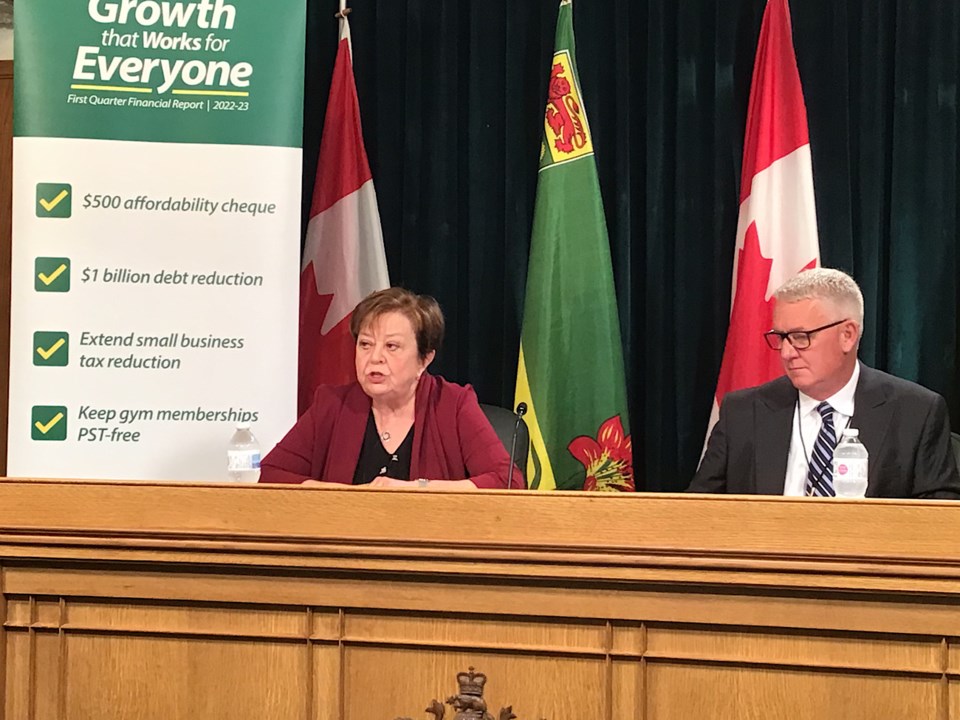REGINA - There has been mixed reaction to the province’s affordability measures announced during the first-quarter financial update Tuesday.
The Saskatchewan Chamber of Commerce largely supported the four point affordability plan announced Tuesday, which includes a $500 affordability tax credit, extension of the small business tax rate reduction to 2023, and removal of fitness and gym memberships from the planned PST expansion.
“We continue to navigate the impacts of the pandemic, such as labour market challenges, supply chain disruptions and inflation,” said Saskatchewan Chamber of Commerce CEO Prabha Ramaswamy in a news release. “Many of our members have voiced that they are still facing significant challenges in sustaining their business – specifically with escalating costs. Therefore, we welcome the provincial government’s announcement of a four-point affordability plan.”
The Chamber said extension of the small business tax rate reduction to 2024 will help mitigate the economic impacts the Saskatchewan business community is experiencing. They also supported the government’s decision to retire up to $1 billion in operating debt.
“Right now, businesses value a fiscally prudent government that pays down debt and also invests in its people and in the future of the province,” said Ramaswamy.
But while pleased to see removal of fitness and gym memberships and some recreational activities for those under 18 from the planned October PST expansion, the Chamber said it encourages the provincial government to consider expanding the PST exemption to other sectors and demographics.
Labour was far less enthusiastic. The news release from the Canadian Union of Public Employees called the $500 tax credit a vote buying scheme.
“Scott Moe’s attempt to buy votes ahead of the Meewasin byelection is a cynical move by a government desperate to distract from the many scandals and controversies this government is facing. This thinly veiled attempt to distract voters from this government’s failures will not work,” their release stared.
CUPE also questioned how the money was to be distributed, with high and low-income adults receiving the same amount and no additional funds for adults with dependents.
“The estimated $450 million could be allocated in a more equitable fashion. Not everyone needs a rebate. This money could have been targeted for the people who need it most: families with children, seniors on a fixed income and workers that are struggling to get by on the lowest minimum wage in Canada.”
The Saskatchewan Federation of Labour’s news release stated that while the announcement of a rebate was welcome news, they continued to demand measures to address the “rising cost of living thanks to Sask. Party tax and utility rate hikes and high fuel prices.”
“Today’s financial update proves what we’ve known for months- that the government has been hoarding record resource revenues while at the same time raising taxes and utility rates at the expense of working people,” said SFL President Lori Johb in a news release. “The SFL has been calling on the government to provide relief to working people for months, and while the announcement of a $500 rebate for Saskatchewan workers will help provide relief in the short term, it’s too little and too late. Many workers have already spent well over $500 due to tax hikes and inflation, and they need the government to come up with a plan that will lower the cost of living for the long term well after their rebate cheques have been spent.”
Johb called for additional measures such as increasing the minimum wage immediately to $15 an hour, scrapping all the planned PST hikes and cancelling the power rate hikes, providing relief from high fuel prices, and investing in health care and education.
“The government must use this unprecedented cash windfall to invest in our public healthcare and education systems- today’s update makes it clear that there is no excuse for privatization and cuts.”





